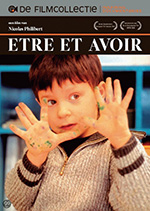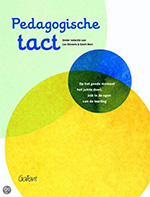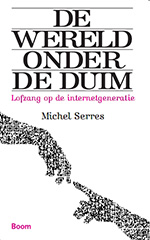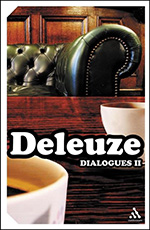 Nergens zo direct als in het boek Dialogues II gaat Gilles Deleuze in op zijn eigen visie op lesgeven. Deleuze gaf jarenlang les op de Universiteit van Parijs, Vincennes-St. Denis. Veel van zijn colleges zijn online nog terug te luisteren. In het fragment hieronder geeft Deleuze aan hoe hij zou willen lesgeven, het lijkt een soort wens of zoektocht omtrent doceren, gebaseerd op zijn eigen ervaring. Het is onderdeel van een bredere reflectie op zijn eigen werk en leven, ontstaan als een interview (of eigenlijk conversatie) met Claire Parnet (die ook te zien is in de film L’Abécédaire).
Nergens zo direct als in het boek Dialogues II gaat Gilles Deleuze in op zijn eigen visie op lesgeven. Deleuze gaf jarenlang les op de Universiteit van Parijs, Vincennes-St. Denis. Veel van zijn colleges zijn online nog terug te luisteren. In het fragment hieronder geeft Deleuze aan hoe hij zou willen lesgeven, het lijkt een soort wens of zoektocht omtrent doceren, gebaseerd op zijn eigen ervaring. Het is onderdeel van een bredere reflectie op zijn eigen werk en leven, ontstaan als een interview (of eigenlijk conversatie) met Claire Parnet (die ook te zien is in de film L’Abécédaire).
Deleuze zegt dat het moet gaan om ‘gewoon ideeën’. Met een verwijzing naar onder meer Bob Dylan (waar hij een heel toepasselijke songtekst van opneemt) en Jean Luc Godard probeert hij duidelijk te maken wat hij bedoelt. Hij wil een soort bende vormen, iets tussen alles en iedereen in. Een mooie opvatting van lesgeven en tegelijk behoorlijk prikkelend qua verwoording en associaties. Het is allemaal te vatten in het lange citaat hieronder, terug te vinden op pagina 5 in het boek:
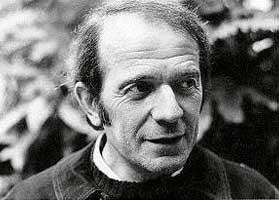
As a teacher I should like to be able to give a course as Dylan organizes a song, as astonishing producer rather than author. And that it should begin as he does, suddenly, with his clown’s mask, with a technique of contriving, and yet improvising each detail. The opposite of a plagiarist, but also the opposite of a master or a model. A very lengthy preparation, yet no method, nor rules, nor recipes. Nuptials without couples or conjugality. Having a bag into which I put everything I encounter, provided that I am also put in a bag. Finding, encountering, stealing instead of regulating, recognising and judging. For recognising is the opposite of the encounter. Judging is the profession of many people, and it is nog a good profession, but it is also the use to which many people put writing. Better to be a road-sweeper than a judge. The more one has been fooled in one’s life, the more one gives lessons: no one is as good as Stalinist in giving lessons in non-Stalinism and pronouncing ‘new rules’. There is a whole race of judges, and the history of thought is like that of a court, it lays claim to a court of Pure Reason, or else Pure Faith … This is why people speak so readily in the name and in the place of others, and why they like questions so much, are so clever at asking them and replying to them. There are also who demand to be judged, if only to be recognised as guilty. In justice they demand conformity, even if this is to rules which they invent, to a transcendence which they claim to reveal or to feelings which motivate them. Justice and correctness are bad ideas. Compare Godard’s formula; not a correct image, just an image [pas use image juste, juste use image]. It is the same in philosophy as in film or a song: no correct ideas, just ideas (pas d’idées juster, justes des idées]. Just ideas: this is the encounter, the becoming, the theft and the nuptials, this ‘between two’ of solitudes.
When Godard says he would like to be a production studio, he is obviously not trying to say that he wants to produce his own films or he wants to edit his own books. He is trying to say just ideas, because, when it comes down to it, your are all alone, and yet your are like a conspiracy of criminals. You are no longer an author, you are a production studio, you have never been more populated. Being a ‘gang’ – gangs live through the worst dangers; forming judges, courts, schools, families and conjugalities again. But what it good in a gang, in principle, is that each goes about his own business while encountering others, each brings in his loot and a becoming is sketch out – a bloc starts moving – which no longer belongs to anyone, but is ‘between’ everyone, like a little boat which children let slip and lose, and is stolen by others.
Het boekje van slechts 124 pagina’s geeft verder nog een toegankelijke en interessante inleiding tot Deleuzes denken over andere centrale thema’s uit zijn werk. Een denken dat hij hier in de preface omschrijft als ‘empirisch’ en ‘pluralistisch’. Deleuze gaat in op het voor hem belangrijke begrip ‘rhizoom’ en op wat hij noemt ‘lines of flight’ en ook op ‘desires’ en ‘assemblages’ die voor zijn denken onmisbaar zijn. Zaken die voor de liefhebber door Semetsky later weer verder zijn uitgewerkt in relatie tot Dewey en onderwijs. Filosofen als Spinoza en natuurlijk zijn samenwerking met Guattari, evenals zijn ideeën omtrent de psychoanalyse worden besproken. En vooral ook literatuur, zoals die van Kafka, Proust en Lewis Carroll en Melville.

